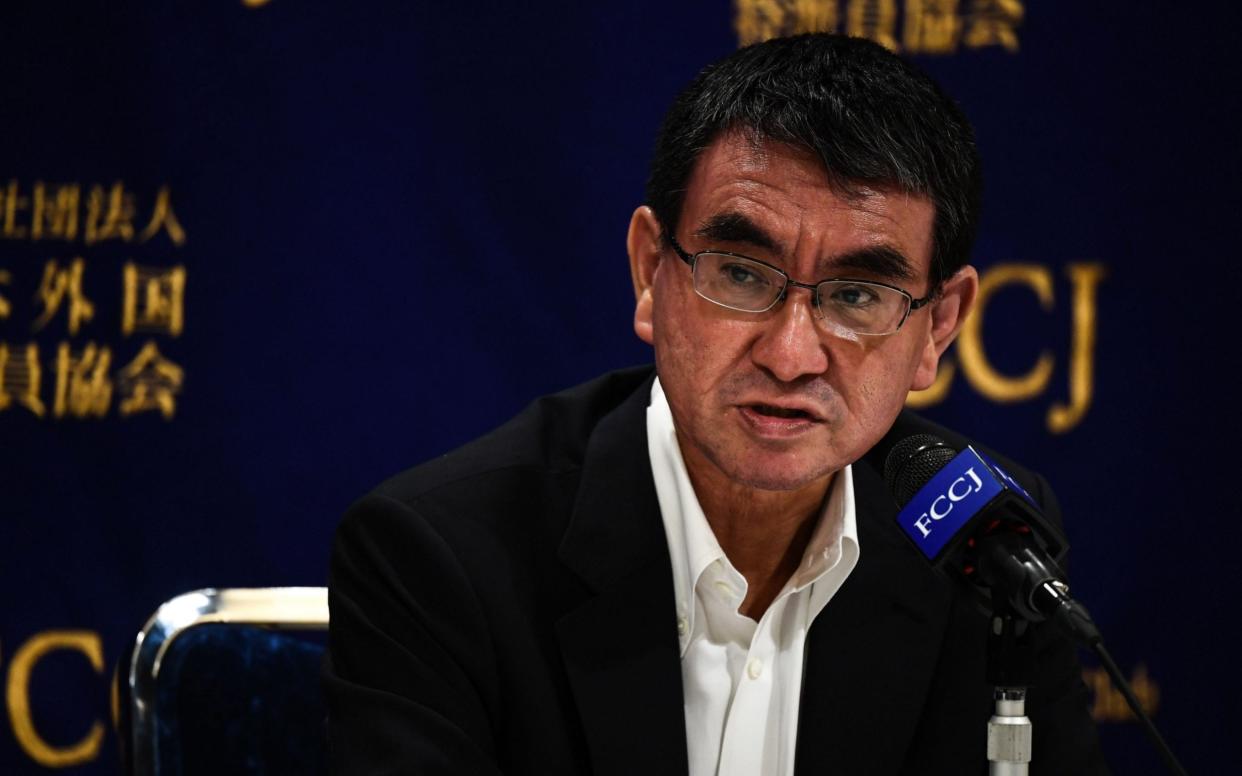Japan and China jostle over disputed islands in East China Sea in 'alarming' escalation

Tokyo has fired a diplomatic salvo at Beijing after China named 50 underwater geographic features close to disputed islands in the East China Sea, a move Japan described as an “alarming” attempt to advance Chinese territorial claims.
Beijing’s announcement is one of a series of recent provocative moves around flashpoints in the Asia-Pacific region that have raised fears of a sudden military escalation.
Taro Kono, the Japanese defence minister, said on Thursday that China was: “Obviously … trying to change the status quo unilaterally in the East China Sea, the South China Sea, at the Indian border and in Hong Kong. It is easy to make connections between these issues.
“Our fighter jets scramble against Chinese airplanes almost every day, sometimes more than once,” he said. “Their armed ships are trying to violate our territorial waters."
The two barren rocks and five islands at the heart of the dispute between Tokyo and Beijing are known as the Senkakus in Japan.

The archipelago, which remains under Tokyo’s administrative control, was home to around 200 Japanese fishermen early last century, but Beijing claims sovereignty dating back to the 1800s, calling the islands Diaoyu. Taiwan also claims the islands it refers to as the Tiaoyutai.
China named parts of the seabed this week in retaliation to a Japanese bill which renamed an administrative area covering the islands.
Yoshihide Suga, Japan’s chief cabinet secretary, downplayed Beijing’s reaction, insisting that “the Senkakus are our country’s inherent territory,” but concerns are rising that China’s growing belligerence could trigger a conflict.
Tensions have been building since April due to the prolonged presence of Chinese Coast Guard operating either within Japanese territorial waters or just outside the 12 nautical mile zone around the islands, on one occasion intimidating a Japanese fishing boat.
“I see China as exploiting a window of opportunity caused by the global confusion surrounding the coronavirus pandemic and while Donald Trump’s administration is on the ropes on the pandemic and focused on the election in November,” said Stephen Nagy, an associate professor of international relations at Tokyo’s International Christian University.

“Beijing seems to be confident enough to demonstrate that it will push ahead with its ‘core interests’ and will have been encouraged because it has met little in the way of significant pushback,” he told The Telegraph.
Dr William Choong, a senior fellow at Singapore’s ISEAS-Yusof Ishak institute, said the likelihood of an escalation due to “an error of judgement or miscalculation” was now getting closer.
“If you look at all the four major flashpoints that we see in the Asia-Pacific today - North Korea, Taiwan, South China Sea and the East China Sea, I think the East China Sea and South China Sea will be pretty high up in terms of combustibility,” he said.
It would only take “one captain of a coastguard or naval ship who decides to be a cowboy for a day” to quickly ratchet up tensions.
“The Covid-induced warming of relations between China and Japan earlier this year, when Japan sent a lot of assistance and surgical masks to China, that’s dissipated,” said Dr Choong, adding that Japan’s renaming of the administrative area showed “both sides are now upping the ante on the dispute.”

Tsai Ing-wen, Taiwan’s president, on Wednesday appealed for calm but also reiterated Taiwan’s claim to sovereignty over the islands.
Any military dispute in the East China Sea would inevitably embroil democratic Taiwan, which China claims as its own territory and seeks to annex.
In recent weeks, Beijing has also intensified its military intimidation of the island of 23 million, with the People’s Liberation Army Air Force (PLAAF) breaching Taiwan’s air defence identification zone some eight times in under two weeks, prompting Taiwan to scramble its own fighter jets in response.
Watch video below
China should focus on fighting the resurgent coronavirus in Beijing and looking after its own people rather than “disturbing” Taiwan with military drills and jeopardising regional peace, Su Tseng-chang, Taiwan’s premier, said on Tuesday.
However, the South China Sea Strategic Probing Initiative, a Chinese think tank, on Thursday accused the US of sending military aircraft to conduct surveillance missions over waters near Taiwan, claiming this had prompted the PLAAF to increase its own activity in the region.


